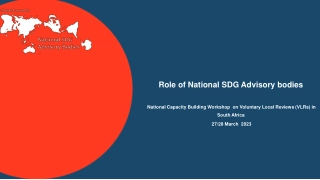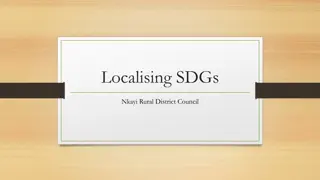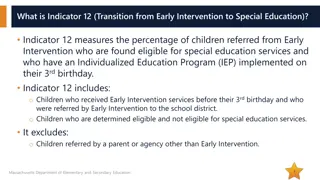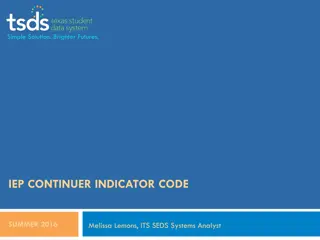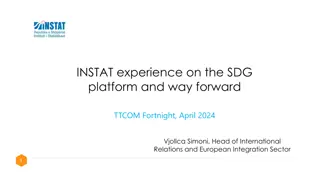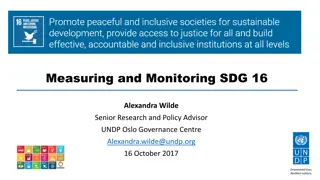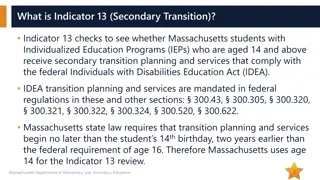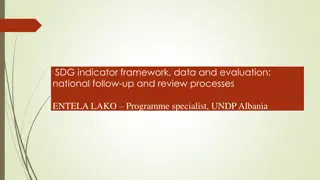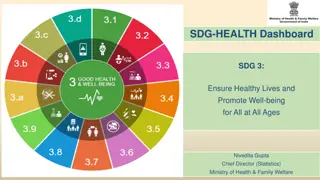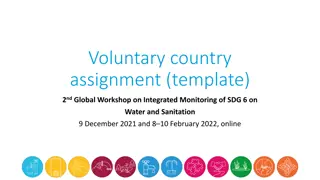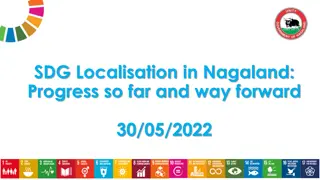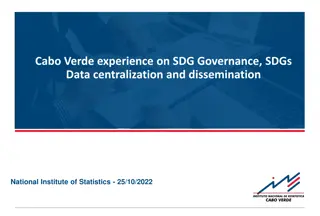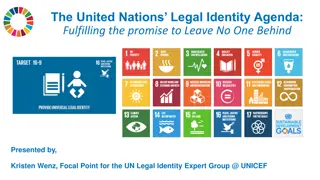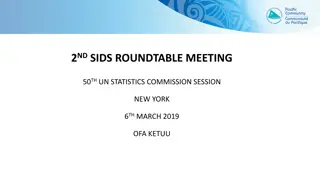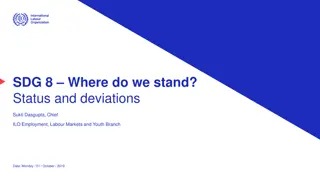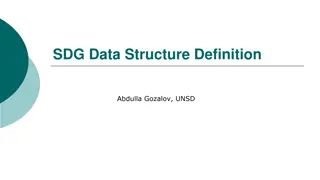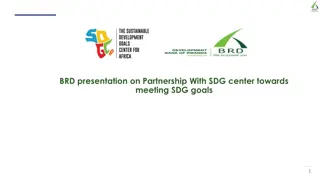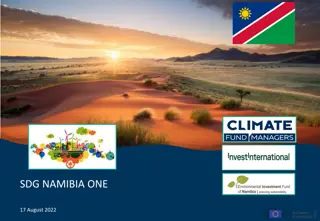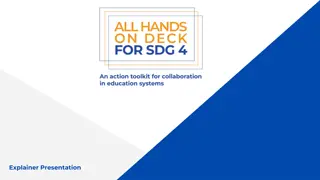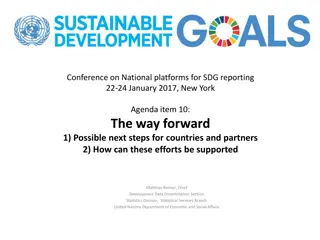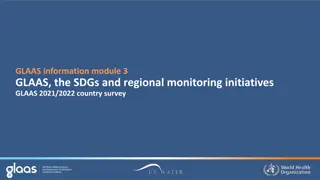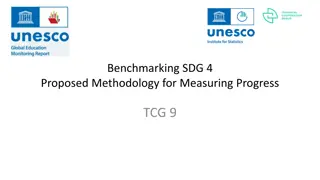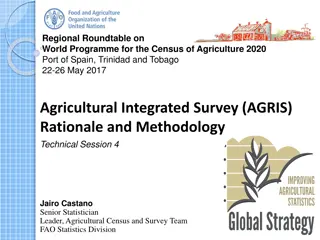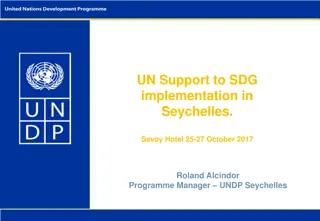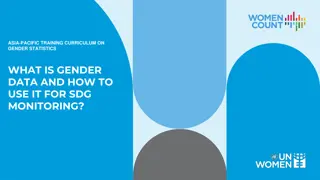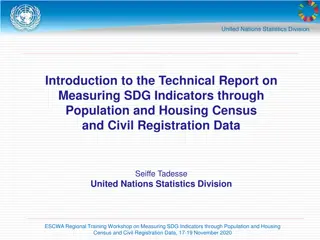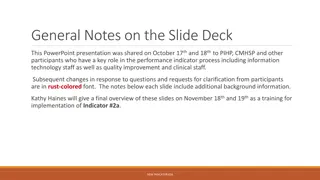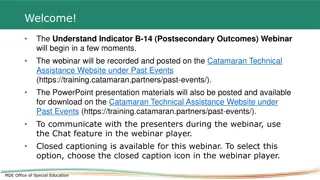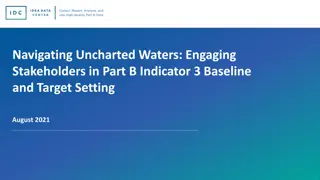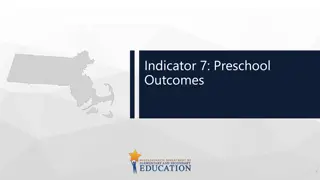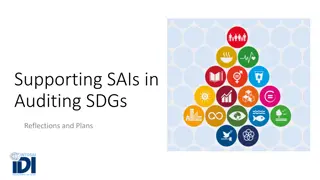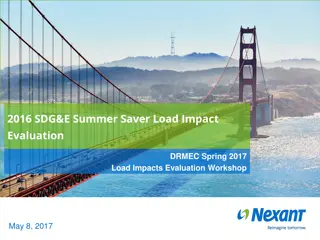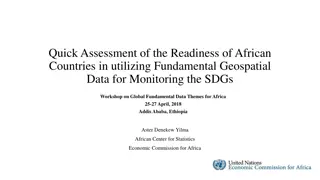The SDG Accelerator Fund
The SDG Accelerator Fund aims to establish a replicable financial facility that links key actors and utilizes blockchain technology to support SMEs in achieving the Sustainable Development Goals. With investments between $100,000 to $2.5 million per venture, the fund promotes cost-effectiveness, tra
1 views • 9 slides
SDG Indicator 6.5.1 Implementation & Monitoring 2023 Overview
Implementing Integrated Water Resources Management (IWRM) in the context of SDGs, with progress reports and stakeholder engagement. Access monitoring guides for SDG 6 Indicator 6.5.1. Discover the timeline for reporting in 2023, including stakeholder consultation processes. Participate in the SDG 6.
6 views • 38 slides
Role of National SDG Advisory bodies
Explore the evolution and importance of national SDG advisory bodies in advancing sustainable development goals, focusing on multi-stakeholder partnerships and global cooperation. Learn how these bodies play a crucial role in mobilizing resources and knowledge to support the achievement of SDGs.
0 views • 22 slides
Enhancing Youth Engagement for Sub-National SDG Reviews in Zimbabwe
Youth engagement in the Sustainable Development Goals (SDGs) is crucial in Zimbabwe as young people can bring fresh perspectives and drive innovation. To ensure robust sub-national SDG reviews, investment in youth capacity building, more decision-making opportunities, addressing specific youth needs
5 views • 14 slides
Empowering Local Communities: SDG Implementation in Nkayi Rural District Council
Actions taken on SDG implementation in Nkayi Rural District Council, a less developed area in Zimbabwe, illustrate strategic planning aligned with national priorities. Through program-based budgeting and community-driven initiatives, the council addresses key areas like governance, social services,
0 views • 14 slides
Enhancing Data Exchange for SDG Monitoring with Advanced SDMX Converter
Explore the advanced features of SDMX Converter that streamline data and metadata exchange for SDG monitoring. Learn about transcoding, parameter worksheets, and how to simplify mapping efforts for more efficient data processing.
6 views • 12 slides
Understanding Indicator 12: Transition from Early Intervention to Special Education
Indicator 12 measures the successful transition of children from Early Intervention to Special Education by evaluating the percentage of children referred from Early Intervention who are found eligible for special education services and have an Individualized Education Program (IEP) in place by thei
1 views • 6 slides
Texas Education Code Updates for IEP Continuer Indicator
Texas Senate Bill 1867, passed during the 84th legislative session, introduced modifications to exclude students who continue enrolling in high school after expected graduation from longitudinal rates calculation if they meet specified criteria. The updated IEP-Continuer Indicator Code for the 2016-
0 views • 6 slides
INSTAT's Contribution to the SDGs Agenda 2030 in Albania and Future Plans
INSTAT, under the leadership of Vjollca Simoni, has actively contributed to the SDGs Agenda 2030 in Albania through various initiatives such as preparing statistical reports, launching the SDG platform, conducting training sessions, and engaging with stakeholders at national and international levels
0 views • 7 slides
Measuring and Monitoring SDG 16: Challenges and Comprehensive Approach
The article discusses the importance of SDG 16 in creating peaceful, just, and inclusive societies for sustainable development. It highlights the challenges in measuring and monitoring SDG 16, such as complex concepts and contested indicators, along with the need for comprehensive interconnected app
1 views • 11 slides
Understanding Massachusetts Indicator 13 for Secondary Transition Planning
Indicator 13 in Massachusetts assesses the compliance of secondary transition planning and services for students with IEPs aged 14 and above, ensuring adherence to federal laws. The state collects data through file reviews to calculate a statewide compliance rate aiming for 100%. Compliance is measu
0 views • 5 slides
SDG Indicator Framework and Evaluation in National Follow-Up and Review Processes
This content discusses the alignment of the Sustainable Development Goals (SDGs) with the National Strategic Development Initiative II in Albania. It covers key policy areas, government priorities, institutional responsibilities, and the level of alignment between SDG targets and national policies.
0 views • 10 slides
Monitoring Progress of SDG-3 Health Dashboard in India
In India, the Ministry of Health & Family Welfare is actively monitoring the progress of Sustainable Development Goal 3 (SDG-3) through the SDG Health Dashboard. The dashboard facilitates tracking of 73 health indicators, involving various stakeholder ministries. The National Task Force on SDG-3 ove
0 views • 7 slides
Voluntary Country Assignment Template for SDG 6 Workshop
Encouraging countries to undertake a voluntary assignment focusing on SDG 6 monitoring to facilitate cross-sectoral dialogue and informed discussions. The assignment involves gathering information on past monitoring efforts, data communication, policy usage, and future needs from various focal point
0 views • 8 slides
Progress of SDG Localisation in Nagaland: Achievements and Future Directions
Nagaland has made significant progress in localising the Sustainable Development Goals (SDGs) with the establishment of the SDG Coordination Centre and the release of the SDG 2030 Vision Plan. Institutional mechanisms, capacity building workshops, and indicator frameworks have been put in place to d
2 views • 16 slides
Enhancing Governance for Sustainable Development Goals in Cabo Verde
Experience of Cabo Verde on SDG governance, data centralization, and dissemination through a unified statistical report aligning Agendas 2063 and 2030. The National Institute of Statistics plays a vital role in coordinating, compiling, and producing statistical reports, supporting the country's Volu
2 views • 11 slides
United Nations Legal Identity Agenda: Achieving SDG 16.9
The United Nations Legal Identity Expert Group (LIEG) aims to close the global legal identity gap by over 300 million within four years. The group focuses on implementing a life-cycle approach to legal identity, starting from birth, to ensure no one is left behind. The structure and strategy of LIEG
0 views • 10 slides
Pacific Statistics Development Governance Committee Meeting Objectives
The Pacific Statistics Development Governance Committee oversees strategic decision-making in regional statistics development matters. It plays a crucial role in providing guidance, recommendations, and oversight on statistical issues. The committee collaborates with various entities to enhance stat
0 views • 8 slides
Status of SDG 8: Challenges and Progress in Promoting Sustainable Economic Growth and Decent Work
SDG 8 aims to promote sustainable economic growth and decent work for all, but progress has been disrupted by the severe economic impacts of the COVID-19 pandemic. Unemployment rates have increased globally, with particular concerns about informal employment and gender equality. There has been sligh
0 views • 12 slides
Understanding SDG Data Structure Definition
SDG Data Structure Definition by Abdulla Gozalov, UNSD, developed by Working Group on SDMX for SDG Indicators. It includes dimensions like Frequency, Reporting Type, Series, and Reference Area. The single DSD supports diverse indicators, with annual frequency convention. Differentiates between Natio
2 views • 35 slides
Progress of SDG Localisation in Nagaland: Achievements and Path Ahead
Institutional mechanisms for SDG implementation in Nagaland have been established, progress has been made in localising SDGs through capacity building and data updation, and a monitoring mechanism is in place. Challenges exist, but efforts are ongoing to overcome them and move forward towards sustai
0 views • 16 slides
Partnership Between BRD and SDG Center for Sustainable Development in Rwanda
The Development Bank of Rwanda (BRD) has a core mission to support the private sector and contribute to the country's economic growth. By partnering with the SDG Center, BRD aims to strengthen sustainable development practices, share knowledge, and work towards achieving the UN's 2030 Agenda in Rwan
1 views • 13 slides
Sustainable Development Goals (SDG) Initiative in Namibia - Investment Proposal
Partnering with Dutch stakeholders, the SDG Namibia One initiative aims to promote economic prosperity, infrastructure development, and social progression through blended finance mechanisms and green hydrogen projects. The structured fund managers and prospective investor reach outline a strategic a
0 views • 8 slides
All Hands On Deck For SDG 4: A Strategy for Inclusive Education Planning
The All Hands On Deck For SDG 4 Initiative aims to bridge the gap between state and non-state education providers to enhance planning, dialogue, and implementation in underserved communities. Through case studies and a strategic guide, the initiative seeks to create a future where governments levera
1 views • 26 slides
Enhancing Mountain Resilience through SDG Indicator 15.4.2
Fabio Parisi, a dedicated member of the Mountain Partnership Secretariat at FAO, has been actively involved in developing and updating the Mountain Green Cover Index for SDG Indicator 15.4.2. His educational background in crisis and security management, along with a passion for volunteer work in ref
0 views • 7 slides
National Platform for SDG Reporting Conference Recommendations
Discussion points and recommendations from the Conference on National Platforms for SDG reporting held in New York in January 2017, focusing on next steps for countries, partners, and solution providers. Suggestions include developing business cases, sharing experiences, fostering cooperation, condu
0 views • 5 slides
Comprehensive Overview of GLAAS, SDG Monitoring, and Goal 6 Indicators
The content delves into the Global Analysis and Assessment of Sanitation and Drinking-Water (GLAAS), its relationship with the Sustainable Development Goals (SDGs), particularly Goal 6 on clean water and sanitation. It discusses regional monitoring initiatives, the 2030 Agenda for Sustainable Develo
0 views • 16 slides
Proposed Methodology for Benchmarking SDG 4 Progress and Categorizing Recent Progress
The proposed methodology outlines how to benchmark progress on SDG 4 indicators and categorize recent progress based on historical rates. It includes methods for measuring progress, such as benchmarking recent progress against historical rates and identifying the rate of progress needed to achieve n
0 views • 5 slides
Regional Roundtable on World Programme for the Census of Agriculture 2020
There is a pressing need for improved agricultural data, particularly in the context of SDG indicators and global statistics. The Agricultural Integrated Survey (AGRIS) offers a comprehensive solution with a 10-year farm-level integrated survey approach, providing essential data for policy-making, m
0 views • 19 slides
Evaluation of 2015 SDG&E Commercial Thermostat Program
The evaluation of the 2015 SDG&E Commercial Thermostat Program presented at the 2016 PLMA Spring Conference Smart Thermostat Interest Group Workshop provides a detailed overview, methodology, results, enrollment forecasts, additional findings, and recommendations. The program targeted small and medi
0 views • 27 slides
UNDP Support to SDG Implementation in Seychelles - Initiatives Overview
UNDP has been actively supporting the implementation of Sustainable Development Goals (SDGs) in Seychelles through various workshops, awareness campaigns, and strategic partnerships. Initiatives include prioritization workshops, integration of SDGs into national development, and launching a Creole b
1 views • 17 slides
Understanding Gender Data for SDG Monitoring in Asia-Pacific Training Curriculum
This training curriculum delves into the nuances of gender data, distinguishing between sex and gender, and emphasizes the importance of gender statistics for monitoring Sustainable Development Goals (SDGs). It covers the significance of disaggregating data by sex to produce gender statistics, which
0 views • 20 slides
Measuring SDG Indicators through Population and Housing Census
The technical report explores the significance of Population and Housing Census (PHC) and Civil Registration and Vital Statistics (CRVS) data in monitoring Sustainable Development Goals (SDGs). It discusses challenges, objectives, and criteria for selecting SDG indicators, emphasizing the integratio
0 views • 20 slides
Performance Indicator Process Overview for Implementation
This PowerPoint presentation, shared with key stakeholders, focuses on a new indicator (#2A) tracking the completion of biopsychosocial assessments within 14 days of a non-emergency service request. The data includes populations like MI adults, MI children, IDD adults, and IDD children. Medicaid eli
0 views • 31 slides
Understanding Postsecondary Outcomes - Indicator B-14 Webinar Overview
The Indicator B-14 webinar provides information on postsecondary outcomes for youth with IEPs, focusing on indicators like higher education enrollment and competitive employment within one year of leaving high school. The webinar covers survey procedures, response rates, and results from the Michiga
0 views • 51 slides
Understanding Changes in Stakeholder Engagement for Indicator 3 Baseline and Target Setting
Explore the modifications in Part B State Performance Plan/Annual Performance Report (SPP/APR) Indicator 3 concerning children with IEPs on statewide assessments. Discover new requirements for stakeholder and parent engagement, gain insights into strategies for engaging stakeholders, and grasp the d
0 views • 30 slides
Understanding Preschool Outcomes: Indicator 7 Insights
Explore Indicator 7 focusing on preschool children with IEPs and their improvements in social-emotional skills, knowledge acquisition, and appropriate behaviors. Learn why Indicator 7 is crucial for development and learning, see data measurements, targets for upcoming years, and access additional va
0 views • 7 slides
Supporting SAIs in Auditing SDGs: Reflections and Plans
SAIs play a crucial role in auditing SDGs to ensure high-quality audits of partnerships. Various SAIs and funding partners are actively involved in supporting this initiative. The story so far includes audits of preparedness and implementation of SDGs, with performance audits supporting 73 SAIs and
0 views • 14 slides
Evaluation of SDG&E Summer Saver Program 2016
Detailed evaluation of the 2016 SDG&E Summer Saver program, including program overview, methodology, results, and impacts on residential and small commercial customers. The program offered demand response events to control central air conditioning load, with participants incentivized through annual
0 views • 16 slides
Assessment of Geospatial Data Readiness for SDG Monitoring in African Countries
Quick assessment conducted during the workshop in Addis Ababa, Ethiopia, revealed the utilization of geospatial data for national and regional planning among African countries. Findings indicate the availability of fundamental geospatial datasets, highlighting the importance of incorporating geoinfo
0 views • 18 slides


